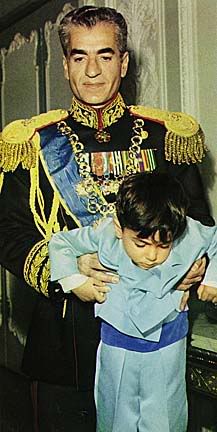Regime Change: Here We Go Again
Three weeks ago in The New Yorker, Connie Brucks wrote "Exiles", about Iranian expatriates and, more importantly, what the U.S. government and those that try to influence it think about what the U.S. should do with regard to Iran. Given my own interest in Iran and my country's misadventures of late, I can't help but comment, even if belatedly. According to Brucks there's a significant number of neoconservatives running around who'd love to see the U.S. overthrow the government of Iran - after the neo-con screw up in Iraq it's hard to believe that these people still show their faces and get attention, but then that's how you survive in DC - you're shameless and do what you can to get press. Apparently the neo-cons are looking for an Iranian version of the Iraqi Ahmad Chalabi, a chameleon who certainly couldn't have made his neo-con supporters very happy given his tap dancing in Iraq once he was on his own. What's really amazing, given it's fundamental idiocy, is that Reza Pahlavi, the son of the deposed Shah of Iran, is potentially in line to be the anointed recipient of American support to cause regime change in Iran, something only the geniuses that brought us the Iraq debacle could come up with. There are many reasons to have a problem with Pahlavi, not the least being that he's every bit as insipid as his father, Mohammad Shah, was. Then there's the historical clumsiness that's attendant to this. Mohammad Shah was on the outs with the Iranian government in the early 1950's, and for all intents and purposes was out of a job as a monarch; the government of Mossadeq was in charge and a new dawn was coming to Iran, and Mohammad had fled the country. The British, who after WW II had the most to lose by an Iran-first government such as Mossadeq's, and it was not happy about Mossadeq and his clique. The British decided to do something about Mossadeq, but it needed the U.S. government to help it. So with funding from the CIA the British and CIA agents in Iran at the time were able to stage a coup against Mossdadeq and they brought the Shah back to the throne and control over the government. He immediately proceeded to work out oil terms that were highly favorable to the British and which essentially guaranteed his place on the throne until his abuses came home to roost in 1979 with the Iranian Revolution and Ayatollah Khomeini. So the neo-cons want to send Reza Shah back to Iran, repeating a historical incidence of meddling by the U.S. government which Iranians, who otherwise tend to like this country, still feel very strongly about. How clever is that? Reza Pahlavi apparently has a strong following from monarchists in the DC and LA ( the LAranians) Iranian communities. How anyone but an Iranian monarchist, especially in the U.S. government, could take seriously putting a Pahlavi back on the throne simply stretches the imagination, regardless of the historical stupidity it calls up. But then we're talking about neo-cons, and, well, what's another silly contradiction, like a democracy supporting a monarchist, when we have such a wonderful track record of contradictions lately, largely attributable to neo-cons, to wit: - Going after non-existent WMD in Iraq actually encourages nuclear weapon development in Iran. - Fighting terrorists "over there instead of here" has increased the overall number of terrorists over there, and the enmity felt towards the U.S. by many living "over there" has increased as well. - Exporting democracy puts theocratically-inclined organizations like Hamas, the Islamic Brotherhood, and the Iraqi Shia majority into power. - And to facilitate regime change in Iran, the neo-cons support the Mujahideen-e Khaleq (the People's Mujahideen, or otherwise the MEK), a group our own government lists as a terrorist organization, with the ultimate hope that they'll be the spearhead to change in Iran - so in our war on terrorism we're apparently not above employing terrorists we happen to agree with, or who may otherwise serve our purposes. There's a great deal of talk these days about how Iran is a major threat to this country. I question to what extent that this is true, but what I'm sure of is that if the people who got us into the mess in Iraq are the ones trying to plan how we handle Iran, then we're in for a world of hurt. I have a hard time believing that anyone in the government would seriously think of military action against Iran, but I suppose "all options are on the table", as the president and vice-president like to tell the world. I for the life of me can't understand why aggressive diplomatic moves, wherein the U.S. swallows its pride with regard to its embassy being taken over in '79 (I mean, really, we helped to overthrow one of their governments, stuck them with a Shah they didn't want for some 25 years, show down one of their airliners, isn't it about time we were a bit more conciliatory here?), and really pushes positive initiatives to come to terms with the Iranians that would make the peoples of both countries happy, vice feeling like the other country is a threat to happiness, prosperity, and, on the whole, existence.
Mohammad Shah & Reza Shah - You can't trust either one them.

0 Comments:
Post a Comment
<< Home